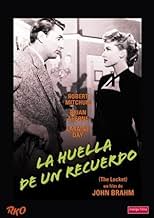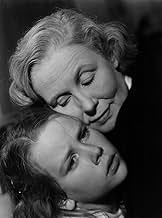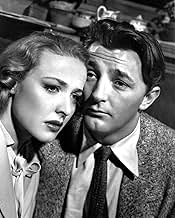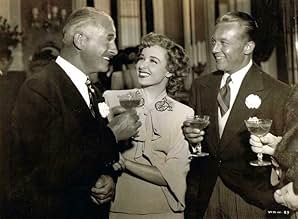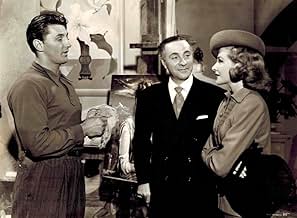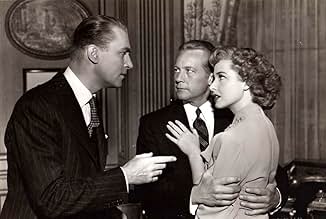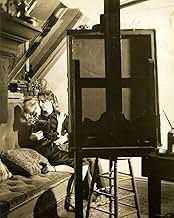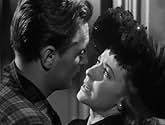NOTE IMDb
7,1/10
3,3 k
MA NOTE
Ajouter une intrigue dans votre langueJust before his wedding, the bridegroom hears a complex tale painting his lovely bride as devilish and unbalanced.Just before his wedding, the bridegroom hears a complex tale painting his lovely bride as devilish and unbalanced.Just before his wedding, the bridegroom hears a complex tale painting his lovely bride as devilish and unbalanced.
Helene Thimig
- Mrs. Monks
- (as Helen Thimig)
Mari Aldon
- Mary
- (non crédité)
Polly Bailey
- The Cook
- (non crédité)
Histoire
Le saviez-vous
- AnecdotesNorma Barzman's lengthy treatment for this film, which Sheridan Gibney revised into a screenplay, was inspired by a true event which was recounted to her by financier George Peabody Gardner and his sister Belle. When younger, the Gardners eschewed their aristocratic upbringing partly in reaction to an incident in their youth: As children they became friendly with the daughter of the family's housekeeper. It transpired that the daughter was wrongly accused of stealing a locket, leading to the firing and departure of the housekeeper and her daughter. Years later, they learned that the daughter suffered from depression and was implicated in a theft, a consequence for which the Gardners felt their family was partly responsible.
- GaffesAmerican ambulances, shown driven with left-hand drive, were not used in wartime London.
- Citations
Norman Clyde: I don't take money for nothing. I'm not conducting a class so the parasitic rich can escape boredom. I'm not that hard up.
Nancy Patton: Well, I hope you never will be, Mr. Clyde. I admire your principles. I wish I could say the same for your disposition.
- ConnexionsEdited into Histoire(s) du cinéma: Fatale beauté (1994)
Commentaire à la une
The Locket (1946)
Well, when you have a post-war movie with Robert Mitchum at his young prime, you can't go wrong.
The star (or starlet, as they used to say) is actress Laraine Day playing Nancy, and she pulls off a charming, attentive, smart perfect woman. A bride to be, in fact. The movie starts with people arrive to a high class wedding. Mitchum shows up via flashback (classic film noir stuff). In fact, there is a flashback within a flashback within a flashback (4 levels) and it's sort of fun.
There are some great lines like, "If you'e lucky you can afford to be nice." But some of the dialog, and maybe the plot overall, is a hair stiff at times.
Director John Brahm is not well known, but his "Hangover Square" the year before is really great. And this one shows a consistent sense of storytelling and drama with highs and lows if not always fully developed characters. The key character is Nancy, who uses her charm to win over the audience as well as the men around her in the plot. Day plays her role perfectly—swiveling sweetness against a just perceptible insincerity. She's a terrific liar.
Which brings me back to Mitchum, who is good but seems to be reading rehearsed lines too often. I think there was supposed to be chemistry between Day and Mitchum, but it wasn't there, even though they both look terribly good.
Though it has a noir-like flavor, this strikes me as a straight up melodrama overall, and with soaring music and lots of dramatic lighting there is no way to not get absorbed in it. There are some short but well done scenes of London during the war (bombs and blackouts).
A well done and lesser known good one. And a fun curiosity—the crazed music box music that denotes an uneven state of mind is the same as that used in the "Bad Seed."
Well, when you have a post-war movie with Robert Mitchum at his young prime, you can't go wrong.
The star (or starlet, as they used to say) is actress Laraine Day playing Nancy, and she pulls off a charming, attentive, smart perfect woman. A bride to be, in fact. The movie starts with people arrive to a high class wedding. Mitchum shows up via flashback (classic film noir stuff). In fact, there is a flashback within a flashback within a flashback (4 levels) and it's sort of fun.
There are some great lines like, "If you'e lucky you can afford to be nice." But some of the dialog, and maybe the plot overall, is a hair stiff at times.
Director John Brahm is not well known, but his "Hangover Square" the year before is really great. And this one shows a consistent sense of storytelling and drama with highs and lows if not always fully developed characters. The key character is Nancy, who uses her charm to win over the audience as well as the men around her in the plot. Day plays her role perfectly—swiveling sweetness against a just perceptible insincerity. She's a terrific liar.
Which brings me back to Mitchum, who is good but seems to be reading rehearsed lines too often. I think there was supposed to be chemistry between Day and Mitchum, but it wasn't there, even though they both look terribly good.
Though it has a noir-like flavor, this strikes me as a straight up melodrama overall, and with soaring music and lots of dramatic lighting there is no way to not get absorbed in it. There are some short but well done scenes of London during the war (bombs and blackouts).
A well done and lesser known good one. And a fun curiosity—the crazed music box music that denotes an uneven state of mind is the same as that used in the "Bad Seed."
- secondtake
- 7 août 2017
- Permalien
Meilleurs choix
Connectez-vous pour évaluer et suivre la liste de favoris afin de recevoir des recommandations personnalisées
Détails
- Durée1 heure 25 minutes
- Couleur
- Rapport de forme
- 1.33 : 1
Contribuer à cette page
Suggérer une modification ou ajouter du contenu manquant

Lacune principale
By what name was Le médaillon (1946) officially released in India in English?
Répondre
